|
|
|
Sort Order |
|
|
|
Items / Page
|
|
|
|
|
|
|
| Srl | Item |
| 1 |
ID:
172159
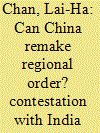

|
|
|
|
|
| Summary/Abstract |
This article argues that China’s Belt and Road Initiative (BRI) can be understood via the lens of regional ordering, whereby China attempts to redefine the shared goals and values for the region of Eurasia and to socialise regional states into the new values in order to have their consent to its leadership. The success of this strategy would then depend, to a large extent, on how its target regional audience reacts to the order-remaking strategy and practices. Taking an ‘eye of the beholder’ perspective, this article focuses on Indian perceptions of China’s order-remaking strategy in South Asia. It posits that India uses the ‘debt trap diplomacy’ narrative to delegitimise China’s infrastructure investment activities based on state capitalism, which have been perceived as a move to upend the status quo and challenge New Delhi’s traditional leadership in the region. To counter China’s growing influence, India is networking with other like-minded countries to promote a ‘free and open Indo-Pacific’ through groupings such as the Asia-Africa Growth Corridor, the Quad, Malabar exercises, and increasing political and economic bonds with the ASEAN countries. A serious contest over order between China and India in the Indian Ocean is looming on the horizon.
|
|
|
|
|
|
|
|
|
|
|
|
|
|
|
|
| 2 |
ID:
117045
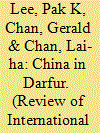

|
|
|
|
|
| Publication |
2012.
|
| Summary/Abstract |
Most people hold that in its quest for natural resources abroad, China shields rogue states with egregious human-rights record from international opprobrium and sanctions. Its political support for Sudan is a case in point. By examining Chinese perspectives on humanitarian intervention and national sovereignty, this article first argues that Beijing's interests are so multiple and complex that concern about the implications of humanitarian intervention for national integration is more crucial than oil in determining its policy towards Sudan. Paradoxically it asserts that China, a non-democratic country, is more influential than liberal democratic states in making the rules of humanitarian intervention in Darfur because of a lack of political will in the West. In addition, there are early signs that China intends to utilise its newfound power to remake international rules regarding territorial sovereignty. Further development is likely to be shaped by its interactions with the United States.
|
|
|
|
|
|
|
|
|
|
|
|
|
|
|
|
| 3 |
ID:
130707
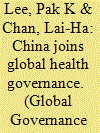

|
|
|
|
|
| Publication |
2014.
|
| Summary/Abstract |
In the wake of China's rapid ascendancy, are there any new rules made by the country in global health governance? This article examines China's emerging role in the Agreement on Trade Related Aspects of Intellectual Property Rights and finds that China adopts a pro-status quo stance on patented medicines. Aspiring to develop its own pharmaceutical sector to be capable to produce patented medicines on a par with the West, it has little appetite for using the prevailing rules or making new rules that are to the liking of the developing world. Undoubtedly, China is a new player in global health governance but has yet to have agenda-setting intent and capacity. This article argues that China's behavior and preferences can be explained by its dualistic national identities, the dominant position of realism in both the study of international relations and policy circles, and an underdevelopment of epistemic community in global health governance in the country.
|
|
|
|
|
|
|
|
|
|
|
|
|
|
|
|
| 4 |
ID:
143923
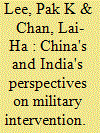

|
|
|
|
|
| Summary/Abstract |
This article addresses the puzzle for students of international relations as to why China and India, two major re-emerging powers in Asia, do not always baulk at military intervention invoked by Chapter VII of the United Nations Charter, while they rhetorically harbour strong reservations about it. The recent cases of Côte d'Ivoire (2011), Libya (2011), Syria (since 2011) and Mali (since 2012) show that both China and India acquiesced in external military intervention in these African countries plunged into brutal civil wars, with only intervention in Syria being rebuffed. By studying how they voted in the United Nations Security Council in 2011–12 and their discourses on intervention, including humanitarian intervention, this article examines why their decisions about intervention in Africa diverged from their decisions regarding intervention in Syria. The authors put forward the thesis that their behaviour can be explained by an interplay between norms and interests, in which they express a common anti-US liberal imperialist stance, shaped by a ‘collective historical trauma' and ‘post-imperial ideology', and demonstrate concerns for state failure and preferences for regional initiatives and political mediation to resolve civil wars.
|
|
|
|
|
|
|
|
|
|
|
|
|
|
|
|
| 5 |
ID:
081230


|
|
|
|
|
| Publication |
2008.
|
| Summary/Abstract |
This paper examines the connection between China's domestic governance and its involvement in global governance in environmental protection by studying the major actors and issues involved in the interaction between the domestic and international spheres of activities. These actors include international institutions, national and local governments, nongovernmental organisations, and others. The paper demonstrates that China has made some substantive progress in protecting its environment, but much more needs to be done. Internationally it seems to lack the will or the capability to make much contribution towards global environmental governance. However, because of its huge aggregate size, what it does or does not do to avert environmental degradation at home could have a significant impact on collective efforts to protect the environment at the global level.
|
|
|
|
|
|
|
|
|
|
|
|
|
|
|
|
| 6 |
ID:
155436
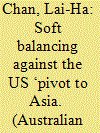

|
|
|
|
|
| Summary/Abstract |
The existing accounts about the China-led multilateral development bank—the Asian Infrastructure Investment Bank (AIIB)—have focused on the USA’s policy concerns and the economic and commercial reasons for China having established it. Two deeper questions are left unaddressed: Was there any strategic rationale for China to initiate a new multilateral development bank and, if so, how effective is China’s strategy? From a neorealist balance-of-power perspective, this article argues that China has felt threatened by the Obama administration’s rebalance to the Asia-Pacific strategy. In response, China is opting for a soft-balancing policy to carve out a regional security space in Eurasia in order to mitigate the threat coming from its east. China’s material power, premised on the fact that the country is a huge domestic market and flush with cash, has proved irresistible for Asian states, with the exception of Japan, to be enticed away from the USA. On the one hand, this article adds weight to the claim that although the USA remains the pre-eminent military power in the Asia-Pacific, it has fallen into a relative decline in regional economic governance; on the other, China’s soft balancing has its own limitations in forming like-minded partnerships with, and offering security guarantees to, AIIB members. A China-led regional order is yet to have arrived, even with the AIIB.
|
|
|
|
|
|
|
|
|
|
|
|
|
|
|
|
|
|
|
|
|